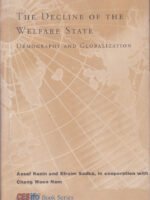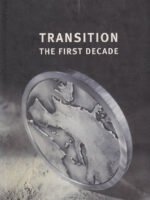-
Imagine No Possessions
₹1,693.00These artists, heeding the call of Constructivist manifestos to abandon the nonobjective painting and sculpture of the early Russian avant-garde and enter into Soviet industrial production, aimed to work as “artist-engineers” to produce useful objects for everyday life in the new socialist collective.
₹3,850.00 -
White Heat Cold Logic
₹1,729.00The advent of personal computing and graphical user interfaces in 1980 signaled the end of an era, and today we do not have so many dreams of technological utopia. And yet our highly technologized and mediated world owes much to these early practitioners, especially for expanding our sense of what we can do with new technologies.
₹3,899.00 -
Windows and Mirrors: Interaction Design, Digital Art, and the Myth of Transparency
₹1,365.00These works, and their inclusion in an important computer conference, show that digital art is relevant to technologists. In fact, digital art can be considered the purest form of experimental design; the examples in this book show that design need not deliver information and then erase itself from our consciousness, but can engage us in an interactive experience of form and content.
₹3,016.00 -
Romance in the Ivory Tower
₹823.00The important question is not whether they should be encouraged or prohibited but whether the choice to engage in such a relationship should be protected or precluded. Abramson argues ringingly that our freedom to make choices–to worship, make a political speech, or fall in love–is fundamental. Rules forbidding faculty-student romances are not only unconstitutional but set dangerous precedents for further intrusion into rights of privacy and conscience.
₹1,750.00 -
Ornaments of the Metropolis
₹1,650.00The book also includes a series of photographs by the author that reflect the ornamental experienceof the metropolis in Paris, Frankfurt, and other cities.
₹3,750.00 -
Frontiers
₹934.00Redclift describes a dialectical process in frontier regions in which human societies and their environments influence and illuminate one another: the frontier can be seen as a crucible in which both nature and civil institutions develop and “co-evolve.
₹1,999.00 -
Natural Experiments
₹1,369.00Layzer’s resolutely practical focus cuts through the ideological and theoretical arguments for and against EBM to identify strategies that hold genuine promise for restoring the ecological resilience of our landscapes.
₹3,050.00 -
Great Lead Water Pipe Disaster
₹1,187.00Troesken examines the health effects of lead exposure, analyzing cases from New York City, Boston, and Glasgow and many smaller towns in Massachusetts, New Hampshire, and England. He draws on period accounts, government reports, court decisions, and economic and demographic analysis to document the widespread nature of the problem, the recognized health effects-particularly for pregnant women and young children-and official intransigence.₹2,599.00 -
Solar Revolution
₹825.00In Solar Revolution, fund manager and former corporate buyout specialist Travis Bradford argues–on the basis of standard business and economic forecasting models–that over the next two decades solar energy will increasingly become the best and cheapest choice for most electricity and energy applications. Solar Revolution outlines the path by which the transition to solar technology and sustainable energy practices will occur.
₹1,750.00 -
Cultivating Science, Harvesting Power
₹1,260.00Through these interventions, Henke argues, science has served as a mechanism of repair for industrial agriculture. Basing his analysis on detailed ethnographic and historical research, Henke examines the history of state-sponsored farm advising–in particular, its roots in Progressive Era politics–and looks at both past and present practices by farm advisors in the Salinas Valley. He goes on to examine specific examples, including the resolution of a farm labor crisis during World War II at the Spreckels Sugar Company, the use of field trials for promoting new farming practices, and farm advisors’ and growers’ responses to environmental issues. Beyond this, Henke argues that the concept of repair is broadly applicable to other cases and that expertise can be deployed more generally to encourage change for the future of American agriculture.
₹2,799.00 -
Food: Alphabet City Magazine 12
₹752.00Food is essential to our sense of place and our sense of self, but today as fast food nation meets the slow food movement and eating locally collides with on-demand arugula our food habits are shifting. Food examines and imagines these changes, with projects by writers and artists that explore the cultural and emotional resonance of food, from the everyday Dada of mashed potatoes and Jell-O to the rocket science of food eaten by astronauts in space.
₹1,599.00 -
America′s Food What You Don′t Know About What You Eat
₹1,186.00We don’t think much about how food gets to our tables, or what had to happen to fill our supermarket’s produce section with perfectly round red tomatoes and its meat counter with slabs of beautifully marbled steak. We don’t realize that the meat in one fast-food hamburger may come from a thousand different cattle raised in five different countries. In fact, most of us have a fairly abstract understanding of what happens on a farm.
₹2,599.00
- Home
- Categories
- Architecture
- Agriculture and Farming
- Business & Management
- Engineering
- Fashion & Textiles
- General and References
- Humanities & Social Science
- Islam
- Library Science
- Literature & Literary Studies
- Mathematics & Statistics
- Media, Information & Communication Industries
- Medicine
- New Arrivals
- On Sale
- Science & Technology
- Sports
- Top Selling
- Travel & Tourism
- Annual Reviews
- Exclusive
- Blog
- Others






















